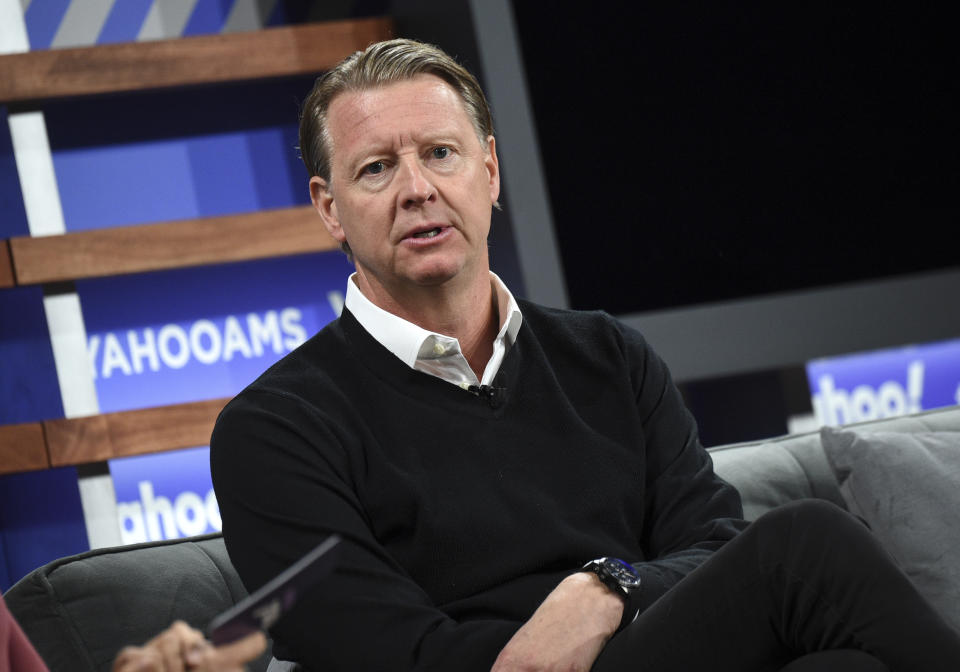Verizon CEO: 5G will transform the world
Verizon (VZ) CEO Hans Vestberg on Thursday said that 5G connectivity will have an enormous impact on how consumers and businesses operate across the globe.
"This is one of the most important technologies to transform the world," Vestberg said during the Yahoo Finance All Markets Summit in New York. (Note: Verizon is the parent company of Yahoo Finance)
5G in the real world

According to Vestberg, Verizon has three main business cases for 5G. There's the main consumer use case, which includes 5G smartphones; there's in-home 5G, which the company began rolling out in 2018; and there is the edge-computing 5G, which is the kind of 5G connectivity that businesses will take advantage of.
"I think we are going to see an extraordinary impact of 5G in the next couple of years here," Vestberg said.
5G is the next generation of cellular wireless technology. It's designed to provide high-bandwidth, low latency connectivity that, in some cases, is 100 times faster than the current 4G LTE connections people rely on today.
Verizon has committed to launching its 5G network in 30 cities by the end of 2019.
"I think that the progress is really good," Vestberg said of the rollout. "We outlined in the beginning of the year that we want 30 markets this year, we have so far launched 13 markets, and they are coming at the latter part of the year.”
Early reviews for Verizon's 5G connectivity in cities like Chicago, one of the first to receive the network, have been mixed. When available, speeds have been incredible, with users reporting speeds of more than 1Gbps. If you're lucky, you'd see as much as 60 Mbps on a 4G LTE signal.
That's a massive jump in performance.
The downside has been the fact that connectivity has been spotty. Users have had to move to very exact spots to connect to a 5G signal, and would lose them when moving more than a few hundred feet away. Physical objects can also obstruct the 5G signals.
That's because Verizon, and rival AT&T (T), are using millimeter wave 5G technology, which sits in the high end of the 5G spectrum. That's where you get those super high-speed connections that have been so hyped by carriers.
"We want to give our customers the first experience of 5G, but we also want to give the best experience and the best experience of the network," he said.
But the fact that millimeter wave runs in such a high band of the radio spectrum means that it can't travel very far — as in losing connectivity when walking a few blocks away from a 5G site. Carriers then have to blanket cities with millimeter wave 5G nodes to ensure that all users can take advantage of such high speeds.
Verizon and AT&T are also working on low band spectrum that will provide the kind of distance you currently expect from your 4G LTE connection, but according to Verizon consumer group CEO Ronan Dunne, low-band spectrum speeds will be similar to "good" 4G LTE service.
Sprint (S), which is set to merge with T-Mobile (TMUS), is currently working with mid-range spectrum, which could give the carrier an early lead in the 5G race. That's because mid-range spectrum will offer far faster speeds than 4G LTE, with a greater range than millimeter wave spectrum. It's basically the happy medium for 5G.
Huawei's impact on Verizon
Of course, you can't talk about 5G technology without bringing up the issue of Huawei. The Chinese telecom giant has been hit with a ban in the U.S. out of fears that the company's ties to China's People's Liberation Army makes it the perfect tool for the country to spy on U.S. interests and citizens.
Vestberg, however, says that won't be an issue for Verizon, as the company has never used Huawei components and never planned to.
What could become a problem, the CEO said, is if the world were to split 5G into two competing standards rather than using the single standard that exists at the moment. That would only happen if Huawei chose to separate itself by creating a second standard 5G standard similar to how 3G was split between CDMA and GSM technologies.
When that happened, users of Verizon devices, which relied on CDMA tech, couldn't use their phones in countries that predominantly used GSM. It split the world, and made traveling with connected devices needlessly difficult.
"If we go back to different standards, CDMA GSM, that's not good," Vestberg said. "That's not good for the planet."
More from Dan:
Email Daniel Howley at [email protected]; follow him on Twitter at @DanielHowley.
Follow Yahoo Finance on Twitter, Facebook, Instagram, Flipboard, SmartNews, LinkedIn,YouTube, and reddit.

